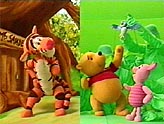Associated Press
A daily smackeral of sweetness and charm: That, in Pooh-speak, sums up "The Book of Pooh."
| ‘The Book of Pooh’
 4:30, 7 and 9:30 a.m. 4:30, 7 and 9:30 a.m.
 Weekdays Weekdays
 Disney Channel Disney Channel
|
A brand-new showcase for the storied cuddle toy, this live-action series is as lovable as its hero, as lush and inviting as the Hundred Acre Wood.
Each half-hour tells two tales about the honey-loving bear and his friends.
Maybe Pooh receives a note inviting him to lunch, signed just "Me." Maybe errand-crazy Rabbit thinks he lost a workday after Pooh, meaning to help, crosses out an extra square on Rabbit’s calendar. Maybe Eeyore arrives at a party only to mutter mulishly, "Hope we don’t play ‘Pin the Tail on the Donkey.’"
Absent from Pooh Corner is a certain mother and child — Kanga and Roo — but you’ll find Piglet, Owl, that mopish donkey Eeyore, the frolicsome Tigger and brand-new character Kessie, a free-spirited bluebird.
Meanwhile, behind "Pooh’s" storybook-come-to-life luster is high-tech handiwork that would wow even Eeyore.
 |
| This video frame shows puppeteers, right, manipulating Pooh and other characters in the new TV series "The Book of Pooh."
TV image via Associated Press |
This marriage of 18th-century puppetry and 21st-century cyberspace will stir wonder beyond its target audience of youngsters. Adults who sneak a peek at the screen should be no less spellbound: What is hold-in-your-hand real? What resides only in a computer? Just try to tell.
The magic is conjured at a squat, windowless building in Manhattan’s Greenwich Village. On this far-from-pastoral sound stage, the only green in sight is blanketing a wall and a portion of the studio floor. Facing this green swath, a camera floats on a zero-gravity crane.
"It’s like a giant animation stage," said creator-executive producer Mitchell Kriegman. "The show is one long special effect."
Before him stands a gaggle of puppeteers in green body suits — it takes as many as four to operate one puppet — who carry out their artistry with rods affixed to different parts of each figure.
In this video version of the Japanese puppet technique called bunraku, the green-garbed puppeteers and their matching background are zapped from the picture, replaced by a computer-generated Hundred Acre Wood.
Here is where the whiz-bang innovation comes in. Kriegman calls it "real-time virtual compositing." This means the studio camera is rigged with orienting sensors linked to Pooh’s virtual world. Whichever way the camera moves — in, out, up, around — the computer’s virtual setting moves correspondingly.
Explains Kriegman, "We’re able to place the puppets in a virtual environment and let the puppeteers perform it in real time, while we use the camera in a completely intuitive way as if it’s in the virtual environment, too."
Which may not entirely make sense, but, considering the finished product, is nothing to pooh-pooh.
One other cool thing: To give themselves maximum flexibility, the producers mix-and-match real and virtual props. That is, for every physical object stored over in the corner of the studio (a tree stump, a bed, Pooh’s "hunny" pots), there’s an identical counterpart stored somewhere on a hard drive. There are even puppet honeybees and computer-byte bees.
Real? Virtual? Just try to tell the difference.
"We’ve needed a technical breakthrough practically every two weeks to do this show," said Kriegman proudly. But the point of all this pixel razzmatazz isn’t to impress computer geeks.
"I wanted to find a way to make Pooh more Pooh."
Although Winnie the Pooh has contentedly inhabited the A.A. Milne-authored books for 75 years as well as the Disney animated cartoons, Kriegman wasn’t satisfied.
He wanted what everyone who loves Pooh dreams about: to breathe life into the little stuffed toy.
[back to top] |

 The Great Index to Fun
The Great Index to Fun